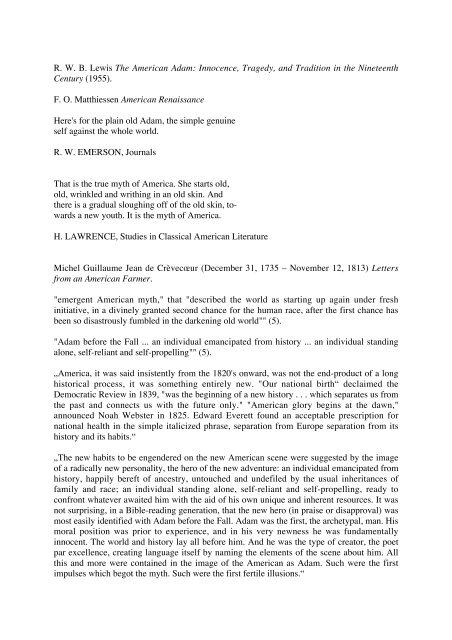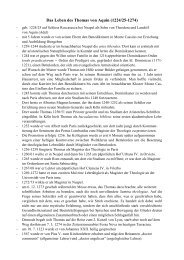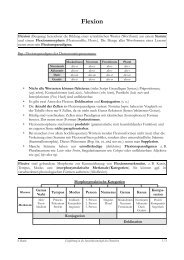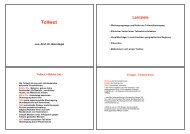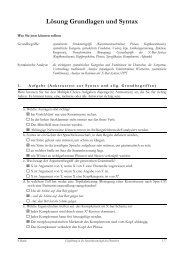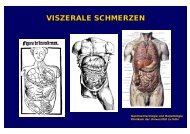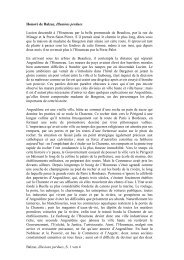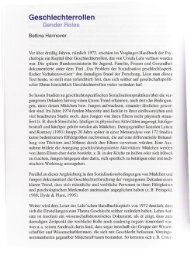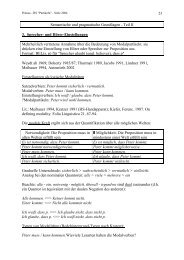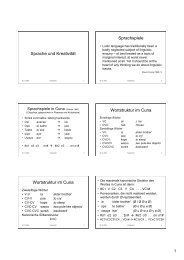R. W. B. Lewis The American Adam: Innocence ... - UK-Online
R. W. B. Lewis The American Adam: Innocence ... - UK-Online
R. W. B. Lewis The American Adam: Innocence ... - UK-Online
Create successful ePaper yourself
Turn your PDF publications into a flip-book with our unique Google optimized e-Paper software.
R. W. B. <strong>Lewis</strong> <strong>The</strong> <strong>American</strong> <strong>Adam</strong>: <strong>Innocence</strong>, Tragedy, and Tradition in the Nineteenth<br />
Century (1955).<br />
F. O. Matthiessen <strong>American</strong> Renaissance<br />
Here's for the plain old <strong>Adam</strong>, the simple genuine<br />
self against the whole world.<br />
R. W. EMERSON, Journals<br />
That is the true myth of America. She starts old,<br />
old, wrinkled and writhing in an old skin. And<br />
there is a gradual sloughing off of the old skin, towards<br />
a new youth. It is the myth of America.<br />
H. LAWRENCE, Studies in Classical <strong>American</strong> Literature<br />
Michel Guillaume Jean de Crèvecœur (December 31, 1735 – November 12, 1813) Letters<br />
from an <strong>American</strong> Farmer.<br />
"emergent <strong>American</strong> myth," that "described the world as starting up again under fresh<br />
initiative, in a divinely granted second chance for the human race, after the first chance has<br />
been so disastrously fumbled in the darkening old world"" (5).<br />
"<strong>Adam</strong> before the Fall ... an individual emancipated from history ... an individual standing<br />
alone, self-reliant and self-propelling"" (5).<br />
„America, it was said insistently from the 1820's onward, was not the end-product of a long<br />
historical process, it was something entirely new. "Our national birth“ declaimed the<br />
Democratic Review in 1839, "was the beginning of a new history . . . which separates us from<br />
the past and connects us with the future only." "<strong>American</strong> glory begins at the dawn,"<br />
announced Noah Webster in 1825. Edward Everett found an acceptable prescription for<br />
national health in the simple italicized phrase, separation from Europe separation from its<br />
history and its habits.“<br />
„<strong>The</strong> new habits to be engendered on the new <strong>American</strong> scene were suggested by the image<br />
of a radically new personality, the hero of the new adventure: an individual emancipated from<br />
history, happily bereft of ancestry, untouched and undefiled by the usual inheritances of<br />
family and race; an individual standing alone, self-reliant and self-propelling, ready to<br />
confront whatever awaited him with the aid of his own unique and inherent resources. It was<br />
not surprising, in a Bible-reading generation, that the new hero (in praise or disapproval) was<br />
most easily identified with <strong>Adam</strong> before the Fall. <strong>Adam</strong> was the first, the archetypal, man. His<br />
moral position was prior to experience, and in his very newness he was fundamentally<br />
innocent. <strong>The</strong> world and history lay all before him. And he was the type of creator, the poet<br />
par excellence, creating language itself by naming the elements of the scene about him. All<br />
this and more were contained in the image of the <strong>American</strong> as <strong>Adam</strong>. Such were the first<br />
impulses which begot the myth. Such were the first fertile illusions.“
„It was the tragedy inherent in his innocence and newness, and it established the pattern for<br />
<strong>American</strong> fiction.“<br />
„<strong>The</strong> dangers, both to life and to letters, of the <strong>Adam</strong>ic ideal were acknowledged at once and have<br />
been repeated endlessly. <strong>The</strong> helplessness of mere innocence has been a primary theme of novelists<br />
in almost every decade, and a source of bewilderment to our political and diplomatic historians. <strong>The</strong><br />
dismissal of the past has been only too effective: America, since the age of Emerson, has been<br />
persistently a one-generation culture. Successive generations have given rise to a series of staccato<br />
intellectual and literary movements with ever slighter trajectories. <strong>The</strong> temper which despised<br />
memory not unnaturally fostered a habit of forgetfulness, and writers who even forgot that there was<br />
anything to remember have found themselves remote alike from their predecessors and their<br />
contemporaries.“<br />
Song of Myself<br />
I celebrate myself, and sing myself,<br />
And what I assume you shall assume,<br />
For every atom belonging to me as good belongs to you.<br />
I loafe and invite my soul,<br />
I lean and loafe at my ease observing a spear of summer grass.<br />
„<strong>The</strong>re, in fact, is the new <strong>Adam</strong>. If we want a profile of him, we could start with the<br />
adjectives Whitman supplies: amused, complacent, compassionating, idle, unitary; especially<br />
unitary, and certainly very easily amused; too complacent, we frequently feel, but always<br />
compassionate expressing the old divine compassion for every sparrow that falls, every<br />
criminal and prostitute and hopeless invalid, every victim of violence or misfortune. With<br />
Whitman's help we could pile up further attributes, and the exhaustive portrait of <strong>Adam</strong> would<br />
be composed of a careful gloss on each one of them: hankering, gross, mystical, nude;<br />
turbulent, fleshy, sensual, eating, drinking, and breeding; no sentimentalist, no stander above<br />
men and women; no more modest than immodest; wearing his hat as he pleases indoors and<br />
out; never skulking or ducking or deprecating; adoring himself and adoring his comrades;<br />
afoot with his vision,<br />
Moving forward then and now and forever,<br />
Gathering and showing more always and with velocity,<br />
Infinite and omnigenous.<br />
And announcing himself in language like that. For an actual illustration, we could not find anything<br />
better than the stylized daguerreotype of himself which Whitman placed as the Frontispiece of the<br />
first edition. We recognize him at once: looking with side-curved head, bending an arm on the<br />
certain rest of his hip, evidently amused, complacent, and curious; bearded, rough, probably sensual;<br />
with his hat on.
Leo Marx: <strong>The</strong> Machine in the Garden<br />
„this ideal has appeared with increasing frequency in the service of a reactionary or false<br />
ideology, thereby helping to mask the real problems of an industrial civilization" (7).<br />
„pastoral fantasy“<br />
„Our writers, instead of being concerned with social verisimilitude, with manners and<br />
customs, have fashioned their own kind of melodramatic, Manichean, all-questioning fable,<br />
romance, or idyll, in which they carry us, in a bold leap, beyond everyday social experience<br />
into an abstract realm of morality and metaphysics“ (343).<br />
“it is true, I might have resisted forcibly with more or less effect, might have run "amok" against<br />
society; but I preferred that society should run "amok" against me, it being the desperate party. (118)<br />
One's-Self I Sing<br />
One's-self I sing, a simple separate person,<br />
Yet utter the word Democratic, the word En-Masse.<br />
(...)<br />
Of Life immense in passion, pulse, and power,<br />
Cheerful, for freest action form'd under the laws divine,<br />
<strong>The</strong> Modern Man I sing.<br />
I wish to speak a word for Nature, for absolute freedom and wildness, as contrasted with a freedom<br />
and culture merely civil—to regard man as an inhabitant, or a part and parcel of Nature, rather than<br />
a member of society. I wish to make an extreme statement, if so I may make an emphatic one, for<br />
there are enough champions of civilization: the minister and the school committee and every one of<br />
you will take care of that. (Walking)<br />
“In short, all good things are wild and free.”<br />
“And when the farmer has got his house, he may not be the richer but the poorer for it, and it be the<br />
house that has got him” (27).
Hawthorne <strong>The</strong> House of the Seven Gables „If each generation were allowed and expected to build<br />
its own houses, that single change, comparatively unimportant in itself, would imply almost every<br />
reform which society is now suffering for. I doubt whether even our public edifices our capitols,<br />
statehouses, courthouses, city-halls and churches ought to be built of such permanent materials as<br />
stone or brick. It were better that they should crumble to ruin once in twenty years or thereabouts, as<br />
a hint to people to examine and reform the institutions which they symbolise.“<br />
“Time is but the stream I go a-fishing in. I drink at it; but while I drink I see the sandy bottom and<br />
detect how shallow it is. Its thin current slides away, but eternity remains. I would drink deeper; fish<br />
in the sky, whose bottom is pebbly with stars. I cannot count one. I know not the first letter of the<br />
alphabet. I have always been regretting that I was not as wise as the day I was born. <strong>The</strong> intellect is a<br />
cleaver; it discerns and rifts its way into the secret of things. I do not wish to be any more busy with<br />
my hands than is necessary. My head is hands and feet” (71).<br />
“All change is a miracle to contemplate; but it is a miracle which is taking place every instant” (12).<br />
“Sometimes, on Sundays, I heard the bells, the Lincoln, Acton, Bedford, or Concord bell, when the<br />
wind was favorable, a faint, sweet, and, as it were, natural melody, worth importing into the<br />
wilderness. At a sufficient distance over the woods this sound acquires a certain vibratory hum, as if<br />
the pine needles in the horizon were the strings of a harp which it swept. All sound heard at the<br />
greatest possible distance produces one and the same effect, a vibration of the universal lyre, just as<br />
the intervening atmosphere makes a distant ridge of earth interesting to our eyes by the azure tint it<br />
imparts to it” (87).<br />
“By a conscious effort of the mind we can stand aloof from actions and their consequences; and all<br />
things, good and bad, go by us like a torrent. We are not wholly involved in Nature. I may be either<br />
the driftwood in the stream, or Indra in the sky looking down on it. I may be affected by a theatrical<br />
exhibition; on the other hand, I may not be affected by an actual event which appears to concern me<br />
much more. I only know myself as a human entity; the scene, so to speak, of thoughts and<br />
affections; and am sensible of a certain doubleness by which I can stand as remote from myself as<br />
from another. However intense my experience, I am conscious of the presence and criticism of a<br />
part of me, which, as it were, is not a part of me, but spectator, sharing no experience, but taking<br />
note of it, and that is no more I than it is you. When the play, it may be the tragedy, of life is over,<br />
the spectator goes his way. It was a kind of fiction, a work of the imagination only, so far as he was<br />
concerned. This doubleness may easily make us poor neighbors and friends sometimes” (94).<br />
“White Pond and Walden are great crystals on the surface of the earth, Lakes of Light. If they were<br />
permanently congealed, and small enough to be clutched, they would, perchance, be carried off by<br />
slaves, like precious stones, to adorn the heads of emperors; but being liquid, and ample, and<br />
secured to us and our successors forever, we disregard them, and run after the diamond of Kohinoor.<br />
<strong>The</strong>y are too pure to have a market value; they contain no muck. How much more beautiful than our<br />
lives, how much more transparent than our characters, are they! We never learned meanness of<br />
them. How much fairer than the pool before the farmers door, in which his ducks swim! Hither the<br />
clean wild ducks come. Nature has no human inhabitant who appreciates her. <strong>The</strong> birds with their<br />
plumage and their notes are in harmony with the flowers, but what youth or maiden conspires with<br />
the wild luxuriant beauty of Nature? She flourishes most alone, far from the towns where they<br />
reside. Talk of heaven! ye disgrace earth” (136).<br />
“If we knew all the laws of Nature, we should need only one fact, or the description of one actual<br />
phenomenon, to infer all the particular results at that point. Now we know only a few laws, and our
esult is vitiated, not, of course, by any confusion or irregularity in Nature, but by our ignorance of<br />
essential elements in the calculation. Our notions of law and harmony are commonly confined to<br />
those instances which we detect; but the harmony which results from a far greater number of<br />
seemingly conflicting, but really concurring, laws, which we have not detected, is still more<br />
wonderful. <strong>The</strong> particular laws are as our points of view, as, to the traveller, a mountain outline<br />
varies with every step, and it has an infinite number of profiles, though absolutely but one form.<br />
Even when cleft or bored through it is not comprehended in its entireness.<br />
“<strong>The</strong> very globe continually transcends and translates itself, and becomes winged in its orbit. Even<br />
ice begins with delicate crystal leaves, as if it had flowed into moulds which the fronds of<br />
waterplants have impressed on the watery mirror. <strong>The</strong> whole tree itself is but one leaf, and rivers are<br />
still vaster leaves whose pulp is intervening earth, and towns and cities are the ova of insects in their<br />
axils.”<br />
“When the sun withdraws the sand ceases to flow, but in the morning the streams will start once<br />
more and branch and branch again into a myriad of others. You here see perchance how bloodvessels<br />
are formed. If you look closely you observe that first there pushes forward from the thawing<br />
mass a stream of softened sand with a drop-like point, like the ball of the finger, feeling its way<br />
slowly and blindly downward, until at last with more heat and moisture, as the sun gets higher, the<br />
most fluid portion, in its effort to obey the law to which the most inert also yields, separates from the<br />
latter and forms for itself a meandering channel or artery within that, in which is seen a little silvery<br />
stream glancing like lightning from one stage of pulpy leaves or branches to another, and ever and<br />
anon swallowed up in the sand. It is wonderful how rapidly yet perfectly the sand organizes itself as<br />
it flows, using the best material its mass affords to form the sharp edges of its channel. Such are the<br />
sources of rivers. In the silicious matter which the water deposits is perhaps the bony system, and in<br />
the still finer soil and organic matter the fleshy fibre or cellular tissue. What is man but a mass of<br />
thawing clay? <strong>The</strong> ball of the human finger is but a drop congealed. <strong>The</strong> fingers and toes flow to<br />
their extent from the thawing mass of the body. Who knows what the human body would expand<br />
and flow out to under a more genial heaven? Is not the hand a spreading palm leaf with its lobes and<br />
veins? <strong>The</strong> ear may be regarded, fancifully, as a lichen, umbilicaria, on the side of the head, with its<br />
lobe or drop. <strong>The</strong> lip (...) laps or lapses from the sides of the cavernous mouth. <strong>The</strong> nose is a<br />
manifest congealed drop or stalactite. <strong>The</strong> chin is a still larger drop, the confluent dripping of the<br />
face. <strong>The</strong> cheeks are a slide from the brows into the valley of the face, opposed and diffused by the<br />
cheek bones. Each rounded lobe of the vegetable leaf, too, is a thick and now loitering drop, larger<br />
or smaller; the lobes are the fingers of the leaf; and as many lobes as it has, in so many directions it<br />
tends to flow, and more heat or other genial influences would have caused it to flow yet farther.<br />
Thus it seemed that this one hillside illustrated the principle of all the operations of Nature. <strong>The</strong><br />
Maker of this earth but patented a leaf. What Champollion will decipher this hieroglyphic for us,<br />
that we may turn over a new leaf at last? (204)
<strong>The</strong> earth is not a mere fragment of dead history, stratum upon stratum like the leaves of a book, to<br />
be studied by geologists and antiquaries chiefly, but living poetry like the leaves of a tree, which<br />
precede flowers and fruit—not a fossil earth, but a living earth; compared with whose great central<br />
life all animal and vegetable life is merely parasitic. Its throes will heave our exuviae from their<br />
graves. You may melt your metals and cast them into the most beautiful moulds you can; they will<br />
never excite me like the forms which this molten earth flows out into. And not only it, but the<br />
institutions upon it are plastic like clay in the hands of the potter. (205)<br />
Symmes Hole: It is not worth the while to go round the world to count the cats in Zanzibar. Yet do<br />
this even till you can do better, and you may perhaps find some "Symmes' Hole" by which to get at<br />
the inside at last. England and France, Spain and Portugal, Gold Coast and Slave Coast, all front on<br />
this private sea; but no bark from them has ventured out of sight of land, though it is without doubt<br />
the direct way to India. If you would learn to speak all tongues and conform to the customs of all<br />
nations, if you would travel farther than all travellers, be naturalized in all climes, and cause the<br />
Sphinx to dash her head against a stone, even obey the precept of the old philosopher, and Explore<br />
thyself. Herein are demanded the eye and the nerve. Only the defeated and deserters go to the wars,
cowards that run away and enlist. Start now on that farthest western way, which does not pause at<br />
the Mississippi or the Pacific, nor conduct toward a wornout China or Japan, but leads on direct, a<br />
tangent to this sphere, summer and winter, day and night, sun down, moon down, and at last earth<br />
down too.<br />
What I have observed of the pond is no less true in ethics. It is the law of average. Such a rule of the<br />
two diameters not only guides us toward the sun in the system and the heart in man, but draws lines<br />
through the length and breadth of the aggregate of a man's particular daily behaviors and waves of<br />
life into his coves and inlets, and where they intersect will be the height or depth of his character.<br />
Perhaps we need only to know how his shores trend and his adjacent country or circumstances, to<br />
infer his depth and concealed bottom. If he is surrounded by mountainous circumstances, an<br />
Achillean shore, whose peaks overshadow and are reflected in his bosom, they suggest a<br />
corresponding depth in him. But a low and smooth shore proves him shallow on that side. In our<br />
bodies, a bold projecting brow falls off to and indicates a corresponding depth of thought. Also there<br />
is a bar across the entrance of our every cove, or particular inclination; each is our harbor for a<br />
season, in which we are detained and partially land-locked. <strong>The</strong>se inclinations are not whimsical<br />
usually, but their form, size, and direction are determined by the promontories of the shore, the<br />
ancient axes of elevation. When this bar is gradually increased by storms, tides, or currents, or there<br />
is a subsidence of the waters, so that it reaches to the surface, that which was at first but an<br />
inclination in the shore in which a thought was harbored becomes an individual lake, cut off from<br />
the ocean, wherein the thought secures its own conditions—changes, perhaps, from salt to fresh,<br />
becomes a sweet sea, dead sea, or a marsh. At the advent of each individual into this life, may we<br />
not suppose that such a bar has risen to the surface somewhere? It is true, we are such poor<br />
navigators that our thoughts, for the most part, stand off and on upon a harborless coast, are<br />
conversant only with the bights of the bays of poesy, or steer for the public ports of entry, and go<br />
into the dry docks of science, where they merely refit for this world, and no natural currents concur<br />
to individualize them. (194)<br />
“Undulation is the gentlest and most ideal of motions, produced by one fluid falling on another.<br />
Rippling is a more graceful flight. From a hill-top you may detect in it the wings of birds endlessly<br />
repeated. <strong>The</strong> two ‘waving’ lines which represent the flight of birds appear to have been copied<br />
from the ripple.”<br />
“We need pray for no higher heaven than the pure senses can furnish, a ‘purely’ sensuous life. Our<br />
present senses are but the rudiments of what they are destined to become. We are comparatively<br />
deaf and dumb and blind, and without smell or taste or feeling. Every generation makes the<br />
discovery, that its divine vigor has been dissipated, and each sense and faculty misapplied and<br />
debauched. <strong>The</strong> ears were made, not for such trivial uses as men are wont to suppose, but to hear<br />
celestial sounds. <strong>The</strong> eyes were not made for such grovelling uses as they are now put to and worn<br />
out by, but to behold beauty now invisible. May we not ‘see’ God? Are we to be put off and<br />
amused in this life, as it were with a mere allegory? Is not Nature, rightly read, that of which she is<br />
commonly taken to be the symbol merely? When the common man looks into the sky, which he<br />
has not so much profaned, he thinks it less gross than the earth, and with reverence speaks of "the<br />
Heavens," but the seer will in the same sense speak of "the Earths," and his Father who is in them.<br />
"Did not he that made that which is ‘within’, make that which is ‘without’ also?" What is it, then, to<br />
educate but to develop these divine germs called the senses? for individuals and states to deal<br />
magnanimously with the rising generation, leading it not into temptation,--not teach the eye to<br />
squint, nor attune the ear to profanity. But where is the instructed teacher? Where are the ‘normal’<br />
schools?”
"As a dancer, having exhibited herself to the spectator, desists from the dance, so does Nature desist,<br />
having manifested herself to soul--. Nothing, in my opinion, is more gentle than Nature; once aware<br />
of having been seen, she does not again expose herself to the gaze of soul."<br />
“It is easier to discover another such a new world as Columbus did, than to go within one fold of<br />
this which we appear to know so well; the land is lost sight of, the compass varies, and mankind<br />
mutiny; and still history accumulates like rubbish before the portals of nature. But there is only<br />
necessary a moment's sanity and sound senses, to teach us that there is a nature behind the ordinary,<br />
in which we have only some vague pre-emption right and western reserve as yet. We live on the<br />
outskirts of that region. Carved wood, and floating boughs, and sunset skies, are all that we know of<br />
it. We are not to be imposed on by the longest spell of weather. Let us not, my friends, be<br />
wheedled and cheated into good behavior to earn the salt of our eternal porridge, whoever they are<br />
that attempt it. Let us wait a little, and not purchase any clearing here, trusting that richer bottoms<br />
will soon be put up. It is but thin soil where we stand; I have felt my roots in a richer ere this. I have<br />
seen a bunch of violets in a glass vase, tied loosely with a straw, which reminded me of myself.”<br />
'what sport doth yield a more pleasing content, and less hurt or charge, than angling with a hook'<br />
(92)<br />
A Week on the Concord and Merrimack Rivers<br />
„Rivers must have been the guides which conducted the footsteps of the first travelers. <strong>The</strong>y are<br />
the constant lure, when they flow by our doors, to distant enterprise and adventure (...). <strong>The</strong>y are<br />
the natural highways of all nations“ (11).<br />
'the river is by far the most attractive highway' (204).<br />
"we seemed to be embarked on the placid current of our dreams, floating from past to future as<br />
silently as one awakes to fresh morning or evening thoughts“ (17).<br />
„its water was fuller of reflections than our pages even“ (61).<br />
„most men have no inclination, no rapids, no cascades, but marshes, and alligators, and miasma<br />
instead“ (137, emphasis added).<br />
'undulation is the gentlest and most ideal of motions, produced by one fluid falling on another'<br />
(338).<br />
“<strong>The</strong> hardest material seemed to obey the same law with the most fluid, and so indeed in the long<br />
run it does. Trees were but rivers of sap and woody fibre, flowing from the atmosphere, and<br />
emptying into the earth by their trunks, as their roots flowed upward to the surface. And in the<br />
heavens there were rivers of stars, and milky-ways, already beginning to gleam and ripple over our<br />
heads. <strong>The</strong>re were rivers of rock on the surface of the earth, and rivers of ore in its bowels, and our<br />
thoughts flowed and circulated, and this portion of time was but the current hour. Let us wander<br />
where we will, the universe is built round about us, and we are central still. If we look into the<br />
heavens they are concave, and if we were to look into a gulf as bottomless, it would be concave also.<br />
<strong>The</strong> sky is curved downward to the earth in the horizon, because we stand on the plain. I draw<br />
down its skirts. <strong>The</strong> stars so low there seem loath to depart, but by a circuitous path to be<br />
remembering me, and returning on their steps.”<br />
“the Currents of the Universal Being circulate through me”
"Who looks upon a river in a meditative hour and is not reminded of the flux of all things? Throw a<br />
stone into the stream, and the circles that propagate themselves are the beautiful type of all<br />
influence." As for Thoreau, for Emerson, water and air are related in their chaotic, fluid-dynamical<br />
aspects: 'the river, as it flows, resembles the air that flows over it; the air resembles the light which<br />
traverses it with more subtile currents”.<br />
'This change in the weather was favorable to our contemplative mood, and disposed us to dream yet<br />
deeper at our oars, while we floated in imagination farther down the stream of time, as we had<br />
floated down the stream of the Merrimack' (391).<br />
„as if by force of example and sympathy after so many lessons, the rocks, the hardest material, had<br />
been endeavoring to whirl or flow into the forms of the most fluid“ (262-3).<br />
Whitman: Democratic Vistas:<br />
„John Stuart Mill's profound essay on Liberty in the future, where he demands two main<br />
constituents, or sub-strata, for a truly grand nationality - 1st, a large variety of character - and<br />
2nd, full play for human nature to expand itself in numberless and even conflicting directions<br />
- (seems to be for general humanity much like the influenes that make up, in their limitless<br />
field, that perennial health-action of the air we call the weather - an infinite number of<br />
currents and forces, and contributions, and temperatures, and cross-purposes, whose ceaseless<br />
play of counterpart upon counterpart brings constant restoration and vitality).“


